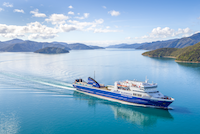Frequently asked Questions about New Zealand
New Zealand is a beautiful country with lush rainforests, stunning mountain chains, geothermal hot pools and some of the World's most recognised tourist towns.
Here are some quick questions and answers to those simple but important questions you may have. For further and more detailed information about New Zealand click here.
Questions
- When is the best time to visit New Zealand?
- What's the climate like?
- What is the water temperature?
- When are school holidays and public holidays?
- What clothes should I take?
- Do I need a passport or visa to enter New Zealand?
- Can I use my credit cards/ATM cards in New Zealand?
- Are there any poisonous animals in New Zealand?
- Is it safe to drink the water in New Zealand?
- What is the voltage of electricity supply in New Zealand? Do I need to take a converter?
- What rental car agencies are in New Zealand?
- Where are the international airports located in New Zealand?
- When is the best time to go trekking/hiking in New Zealand?
- Should I go on a guided walk or an independent walk?
- What types of accommodation are available in New Zealand?
- Do I need to pre-book accommodation?
- What is a 'Farmstay'?
- Which international hotel chains operate in New Zealand?
- Where is the capital of New Zealand?
- What is a 'Kiwi'?
- What kind of night-life is available in New Zealand?
- What types of activities are available for children?
- What is New Zealand's smoking policy?
Answers
When is the best time to visit New Zealand?
You can visit New Zealand at any time of the year. Summer and winter temperatures vary by only about 10ºC over most of the country, making New Zealand an ideal holiday destination all year round.
New Zealand has four quite distinct seasons - Spring (September - November), Summer (December - February), Autumn/Fall (March - May) and Winter (June - August).
In summer there's plenty of sunshine, and activities in and around the water include rafting, snorkelling, diving and kayaking.
You'll find snow on the mountains in winter and excellent skiing. Away from the mountains, New Zealand winters are mild and temperatures generally do not fall below freezing.
Back to top of pageWhat's the climate like?
New Zealand's seasons are the reverse of the Northern Hemisphere. This means that the warmest months are December, January and February, while the coldest are in June, July and August. Don't let cold months put you off - winters tend to be short and generally fairly mild.
What is the water temperature?
The water temperature of the sea surrounding New Zealand varies between seasons, and is warmer the further north you go.
In winter, the ocean temperature surrounding the lower South Island drops as low as 8°C, whilst around the upper North Island water temperatures average around 15°C.
In summer the sea temperature around the South Island varies from around 14°C to 18°C. The North Island water temperatures are lovely and warm at around 20-22°C.
When are School Holidays and Public Holidays?
New Zealand observes a range of public holidays, and the school year is based around 4 terms with seasonal holidays in between. Amenities, accommodations and shops can become very busy over holiday periods, so advance bookings are advised.
» Upcoming New Zealand Holiday Dates
What clothes should I take?
Dress is informal and relaxed on most occasions. Smart casual clothes are acceptable at most restaurants and night-spots. Men are generally not expected to wear suits and ties, except in a few of the top formal bars and restaurants in major cities.
In summer a light jacket or sweater should be included in your luggage should the weather turn cooler or you visit the high country. You can expect some rain, so include a light waterproof jacket or coat.
Pack warm winter clothing if visiting between May and September. Layer your clothing.
Back to top of pageDo I need a passport or visa to enter New Zealand?
All visitors to New Zealand must carry a passport that is valid for at least three months beyond the date you intend to leave the country.
Most visitors who intend to stay for less than three months do not require a visa. If you want to stay longer than three months, or your country of origin does not have a visa waiver agreement with New Zealand, then you will need to apply for a Visitor's Visa.
Read our Passports and Visas section carefully, and if you need more information look at the New Zealand Immigration Service Web site.
Can I use my credit cards/ATM cards in New Zealand?
All major international credit cards can be used in New Zealand and Travellers Cheques are accepted at hotels, banks and some stores. If your credit card is encoded with a PIN number you will be able to withdraw cash from automatic teller machines (ATMs) situated at banks and shopping centres throughout the country.
Back to top of pageAre there any poisonous animals in New Zealand?
New Zealand has no snakes or dangerous wild animals, making it safe for visitors to enjoy outdoor activities.
Is it safe to drink the water in New Zealand?
New Zealand cities and towns have excellent water supplies and in all cases tap water is fresh and safe to drink. Water from rivers and lakes should be boiled, chemically treated or filtered before drinking to avoid stomach upsets.
Back to top of pageWhat is the voltage of electricity supply in New Zealand? Do I need to take a converter?

Electricity is supplied throughout New Zealand at 230/240 volts (50 hertz), although most hotels and motels provide 110 volt AC sockets (rated at 20 watts) for electric razors only.
For all other equipment, an adapter/converter is necessary, unless the item has a multi-voltage option. Please note that power outlets only accept flat three or two-pin plugs, depending on whether an earth connection is fitted.
What rental car agencies are in New Zealand?
The main international companies such as Avis, Hertz and Budget operate in New Zealand. There are also local rental companies. Find rental car companies here.
Back to top of pageWhere are the international airports located in New Zealand?
New Zealand's international airports are at Auckland, Wellington and Christchurch. Some flights from Australia also land at Hamilton, Palmerston North, Queenstown and Dunedin.
When is the best time to go trekking/hiking in New Zealand?
Tracks such as the Abel Tasman, Heaphy and Queen Charlotte Sounds Walkway located at the top of the South Island can be walked all year round. However, those tracks at higher altitudes such as the world famous Milford Track, Kepler and Routeburn are closed in the winter due to snow.
You must book to walk the Milford and Routeburn tracks, which are open between October and April.
Back to top of pageShould I go on a guided walk or an independent walk?
If you like hot showers and other home comforts, you should book a guided walk. But if you don't mind 'roughing it a bit' then try independent walking, carrying your own pack and staying in basic huts or tents.
If you wish to walk the popular Routeburn and Milford Tracks, you will need to book through the Department of Conservation's Great Walks Booking Office. Email greatwalksbooking@doc.govt.nz for further information or fax +64 3 2498 515.
What types of accommodation are available in New Zealand?
New Zealand offers a wide range of accommodation options from top-class hotels, exclusive lodges, motels, guest houses, and farm or homestays to holiday parks and backpacker hostels.
You might also like the freedom to discover New Zealand at your own pace in a campervan. Two, four or six berth vans are available to rent, offering all the comforts of home including a shower, refrigerator and microwave.
Back to top of pageDo I need to pre-book accommodation?
It's a good idea to book at least your first two nights in advance, especially during the busy summer period in New Zealand - from December to February. Visit the local Visitor Information Centre to book further travel.
What is a 'Farmstay'?
Farm and homestays are an ideal way to get to meet local people and experience a slice of New Zealand rural life.
Depending on the kind of farm, you may get the chance to share home cooked meals with your hosts and join in with milking cows, shearing sheep, lambing, kiwifruit harvesting or whatever else is happening on the farm.
Back to top of pageWhich international hotel chains operate in New Zealand?
Flag, Ibis, Quality, Rydges and Novotel are found in the main centres and resort areas. Room rates range from NZ$200 to NZ$1000+ per night.
Where is the capital of New Zealand?
Wellington is the political, banking and financial centre for New Zealand. The Parliament building known as the 'Beehive' is one of the city's top attractions.
The National Archives, National Library and Old Government Buildings (the second largest wooden building in the world) are located nearby and are open to casual visitors free of charge.
Back to top of pageWhat is a 'Kiwi'?
The kiwi, New Zealand's national emblem, is a flightless bird with hair-like feathers and a long, slender bill which it uses to pull worms and insects out of the ground. Found only in New Zealand, it is active at night in the wilderness areas of the country. Be sure to visit one of the many kiwi houses where you can watch them under special 'nocturnal' lighting.
New Zealanders often refer to themselves as Kiwis, and the term is also used as a short form for the famous kiwifruit. On the stock exchange, the New Zealand Dollar is also referred to as 'the kiwi'.
What kind of night-life is available in New Zealand?
Lively DJ and band scenes, particularly in the larger cities, have given New Zealand's night life a renewed vibrancy. You will find a variety of night-clubs, cabarets, pubs, concerts and live performances to choose from, and there are also four casinos, in Auckland, Christchurch, Dunedin and Queenstown.
Back to top of pageWhat types of activities are available for children?
If you are thinking about visiting with your family, you can be confident that New Zealand has a wide range of activities to keep your children happy.
New Zealand's parks and large areas of unspoilt wilderness are ideal places to expand your children's appreciation of wildlife and the outdoors. Horse riding, snow activities, whale watching, fruit picking and wildlife centres and zoos are just some of the choices available.
If you are visiting the larger centres, you will find a range of themed attractions including Rainbow's End (Auckland), Splash Planet (Hastings), Marine Land (Napier) and the International Antarctic Centre (Christchurch). Te Papa, New Zealand's interactive national museum, has a range of activities for the whole family to enjoy, including Story Place, a haven for small children.
Most family restaurants have childrens' menus and high chairs. Many cafes also have high chairs, and a toy basket to amuse babies and toddlers is becoming increasingly common in both cafes and shops.
Most public gardens have well equipped play areas for young children, as do many holiday parks. Adventure playlands such as Chipmunks or Lollipop's Playland are always popular with the very young--these can be found in most main centres.
Visitor Information Centres are a good source of information about activities that are fun for the whole family.
What is New Zealand's smoking policy?
To protect people from the health effects of second-hand smoke, smoking in all hospitality venues, including bars, restaurants, cafes, and casinos, is prohibited in New Zealand. If you smoke, please remember to smoke outside.
View more key facts and information about New Zealand.













